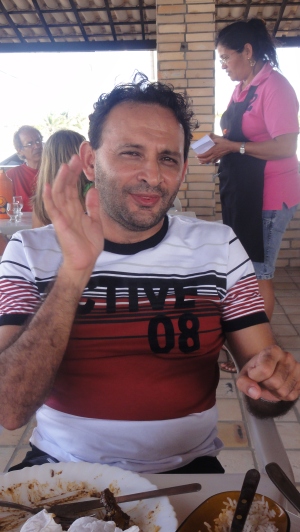LEARN OVER A THOUSAND PORTUGUESE WORDS IN A FEW MINUTES
Last activity 07 December 2022 by Mickael
59870 Views
102 replies
Subscribe to the topic
Post new topic

For all of you English speaking members who are struggling to learn or improve your Portuguese, believe it or not you can learn over 1000 Brazilian Portuguese words in under ten minutes if you understand a few of the basic rules of the language.
PLEASE REFER BACK TO THIS POSTING FROM-TIME-TO-TIME BECAUSE IT WILL BE CONSTANTLY UPDATED WITH NEW MATERIAL AT THE END.
English words ending in AL
These words do not change at all, they are just pronounced differently and usually there is a bit more stress on that syllable ( use the OW sound in WOW NORMAL = NORM-OW, TERMINAL = TERMIN-OW)
NORMAL = NORMAL, CULTURAL = CULTURAL, SOCIAL = SOCIAL, ETC.
English words that end with ITY
Use IDADE (pronounced = ida-dgee) in place of TY or ITY - CITY = CIDADE, SOLIDARITY = SOLIDARIDADE, DIFFICULTY = DIFICULDADE, ETC.
English words that end in TION
Except for the word VACATION (which translates to FERIAS) you use ÇÃO (pronounced like SOUND without the "D") in place of TION - ACTION = AÇÃO, NATION = NAÇÃO,
Pronuncing the plural of these words (pronounced like COINS with an "S" sound on the front)
INFORMATION = INFORMAÇÃO, ETC. in the plural use ÇÕES ACTION = AÇÕES, NATION = NAÇÕES, INFORMATION = INFORMAÇÕES, ETC.
NOTE: In English we consider the word information as plural even though we write it in the singular. In Portuguese this is not the case it can be pluralized informações)
English words that end in SION (EXCEPT PASSION)
We use SÃO (pronounces ZAUN) in place of SION. CONFUSION = CONFUSÃO, CONCLUSION = CONCLUSÃO, EROSION = EROSÃO, ETC.
English words in IBLE or ABLE
Use ÍVEL or ÁVEL (in these words the "I" or "A" is stressed) in place of IBLE or ABLE. HORRIBLE = HORRÍVEL, TERRIBLE = TERRÍVEL, COMFORTABLE = CONFORTÁVEL, RESPONSIBLE = RESPONSÁVEL, ETC. (pronounced HORH-I-VEL / TERH-I-VEL / CON-FOR-TA-VEL / RE-SPON-SA-VEL)
English words that end in ENCY or IENCE
Use ÊNCIA (pronounced - EN-SEE-YA) instead of ENCY. EMERGENCY = EMERGÊNCIA, FLUENCY = FLUÊNCIA, TRANSPARENCY = TRANSPARÊNCIA, SCIENCE = CIÊNCIA, PATIENCE = PACIÊNCIA, ETC.
English words ending in LY or LLY
Use MENTE (pronounced - MEN-TCHEE) instead of LY or LLY. USUALLY = USUALMENTE, TOTALLY = TOTALMENTE, ORIGINALLY = ORIGINALMENTE, ETC.
Portuguese Gerunds
Usually we just add ANDO or INDO (pronounced - AN-DOUGH or IN-DOUGH) to the end of the Portuguese verb.
WALK = ANDAR WALKING = ANDANDO, LAUGH = RIR LAUGHING = RINDO, ETC.
When the Gerund expresses an abstract concept, a process or activity then we add MENTO (pronounced - MEN-TOW) to the end of the verb.
PROGRESS (andar)= ANDAMENTO KNOW = CONHECER, KNOWING = CONHECENDO but the concept KNOWLEDGE = CONHECIMENTO / CLOSE = FECHAR, CLOSING = FECHANDO, CLOSING(of the)... [as in contract,for example] = FECHAMENTO
Portuguese Diminutives and Augmentatives
We add the diminutive INHO or INHA (pronounced EEN-YO or EEN-YAH) to the end of the Portuguese noun depending on its gender, so can say CHILD = CRIANÇA or we can say LITTLE CHILD = CRIANÇINHA, RAIN = CHUVA or LITTLE (FINE) RAIN = CHUVINHA, SON = FILHO or LITTLE SON = FILINHO, DOG = CACHORRO or LITTLE DOG = CACHORRINHO, ETC.
We add the augmentative ÃO or RÃO (pronoucing the "ow" like we do instead of saying ouch! and giving it a nasal sound on the end OW-N or ROW-N) regardless of gender of the noun. RAIN = CHUVA or BIG RAIN = CHUVÃO, HOUSE = CASA or BIG HOUSE = CASARÃO, CAR = CARRO or BIG CAR = CARRÃO
Portuguese Suffix EIRO/EIRA
The Portuguese suffix EIRO (masc.)/ EIRA (fem.) (pronounced EH-ROW or EH-RAH) is used in several different ways. The suffix can be added to either a noun or verb.
One of the most common uses is to talk about where a person works or what his/her profession is: carta (letter) - carteiro (letter carrier / postman) ; faxina (clean) - faxineiro(a) (housekeeper / cleaning lady); porta (door) - porteiro (doorman); padaria (bakery) - padeiro (baker); cozinha (kitchen) - cozinheiro(a) (cook); etc.
It can also be used to describe what a person does or character traits: bagunça (mess) - bagunceiro(a) (messy person); encrenca (trouble) - encrenqueiro (troublemaker); fofoca (gossip) - fofoqueiro(a) (a gossip);etc.
It also is used to describe what something is used for (or in some cases produces): cinza (ash) - cinzeiro (ashtray); lixo (garbage) - lixeira (wastebasket or garbage can); chá (tea) - chaleira (teapot); laranja (orange) - laranjeira (orange tree); limão (lime) - limeira (lime tree); fogo (fire) - fogueira (fire pit or bonfire);lanche (snack) - lancheira (lunchbox);etc.
BRAZILIAN PORTUGUESE PRONUNCIATION
In Portuguese words beginning with R have an H sound. ROSA is pronounced HO-ZA, RIO is pronounced HIO, RICARDO is pronounced HI-CAR-DO, RIBANCEIRA is pronounced HI-BAN-CEI-RA, ETC. but in any other position R has the sound we are used to.
Portuguese words that have a double R (RR) also have the H sound. CACHORRO is pronounced CA-CHO-HO, HORROROSO is pronounced HO-HO-RO-SO
Portuguese words beginning with DI in many cases have a DGEE sound. DIA is pronounced DGEE-A, DIAMANTE is pronounced DGEE-A-MAN-CHE, ETC.
Portuguese words ending in TE have a CHEE sound. NOITE is pronounced NOI-CHEE, GENTE is pronounced GEN-CHEE, ETC.
Portuguese words ending in B (uncommon), ending in D, K or P (usually acronyms) have a BEE, DGEE , KEY or PEE sound respectively. BOB is pronounced BO-BEE, BAND (the TV network) is pronounced BAN-DGEE, VASP (the now defunct airline company) is pronounced VAS-PEE, ETC. So don't go trying to find your ice skates whe a Brazilian says "HOCKEY" he's talking about music, ROCK. (hockey e hole = rock and roll)
Articles- Use of an article o/a is obligatory in the Portuguese language unlike in English where we often do not use an article. Even when using names, if you are talking about a third person you use the article when saying his or her name.
Example: I saw Tom last week. (Eu vi o Tom na semana passada.)
Will Maria come to the meeting? (A Maria vai vir para a reunião?)
Dropping pronouns - Dropping the pronoun in the spoken language is quite common in the Portuguese language because the conjugation of the verb makes the pronoun obvious. Sometimes this may confuse you, but you will get used to it.
I arrived this morning at 7:00 am. (Cheguei hoje das 07h00. instead of Eu cheguei hoje das 07h00.)
Agreement between articles and possessive pronouns/adjectives with the noun (subject object agreement Articles and pronouns/adjectives must agree with the noun's number and gender - o cachorro (singular masc. noun)- the dog, os cachorros (plural masc. noun) the dogs, meu cachorro - my dog, meus cachorros - my dogs, nosso cachorro - our dog, nossos cachorros - our dogs; a casa - the house (singular fem. noun) as casas - the houses (plural fem. noun), sua casa - your house, as suas casas - your houses, nossa casa - our house, nossas casas - our houses.
Masculine and Feminine Nouns One thing that is difficult for English speakers to adapt to, unless they have previous experience with some Latin based language, is the concept of nouns having a gender. It is not always easy to determine if a noun is masculine or feminine, but in many cases nouns ending in A are feminine and those ending in O are masculine.
The concept of "it" to refer to inanimate objects simply does not exist in the Portuguese language since everything is either masculine or feminine. So you might have to understand the context of the entire spoken phrase in order to understand what o/a/ele/ela refers to.
Example suitcase (mala) is feminine so it takes the article "a" - a mala.
I had a beautiful suitcase, but I lost it.
Eu tinha uma linda mala, mas eu a perdi.
Eu tinha uma linda mala, mas perdi ela.
Thankyou - Unlike in "Continental" Portuguese here MEN always say OBRIGADO and WOMEN always say OBRIGADA no matter who they are speaking to. This is different in Portugual where you say OBRIGADA to women and OBRIGADO to men regardless of the speaker's gender.
Good morning - Bom dia! (BON DGEEAH)
Good afternoon - Boa tarde! (BOA TAR-DGEE)
Good evening/ Goodnight - Boa noite! (BOA NOI-CHEE) note that unlike in English where we use Good evening upon meeting someone and Goodnight only on bidding them farewell or going to bed, in Brazil only the single term is used both ways.
Great, thanks...may I post it on a group site - Real Life English? Minas International? Cheers, Douglas
You can believe that following my arrival in Brazil ten years ago (even though I spoke Portuguese fluently) my heart almost stopped the very first time I entered a supermarket and realized just how much I had to increase my vocabulary immediately or risk death by starvation.
Nobody, certainly none of the schools in Canada, teaches anything beyond the basics about food - bread, milk, meat, corn, apples, etc. As a former Culinary Arts teacher and avid cook specializing in international cuisine I didn't know the Portuguese names of most of the food items and other products found in most supermarkets. I was lost. So I set about researching and made a comprehensive list of translations that I use to teach my students here in Brazil what the English names are. The list has both the English and Portuguese names of each item. Do you know the Portuguese names of all the things you buy at the supermarket, or all the other things you don't buy but the supermarket sells??????
For anyone interested in having a copy of the list please send me a private message (not on this thread) with your e-mail address and I will gladly share it with you. It is in .PDF format so you will need Adobe Acrobat Reader.
Muito obrigado, wjwoodward!
I'm learning Portuguese (just at the beginning), so this is very helpful (although I already knew a few).
Beside that, I'd love to hear more your story about daily life in "Grande Brasil", because I have a big love with this country and planning a visiting in future.
Tchau!
Really helpful and simply explained, thanks!
WOW! This is really good... reading this and I actually.. " Oh yea! you're so right!" I just didn't realize it... thanks and I'll send you a message in your inbox.. this is really helpful for me as I've been here 7 months and am self teaching myself portuguese... Cheers!
The important thing to remember is that when learning Portuguese (or any other language) is that it is SECOND language. Do not set your sights too high. You should never expect to reach the same level of fluency as a native speaker of the language unless you began learning it as a very young child. Relax and enjoy your learning experience... the more you learn more fluent you become the more you will impress the Brazilians you deal with on a day-to-day basis. They almost have awe and reverence for people who master their language.
Cheers,
William James Woodward - Brazil Animator, Expat-blog
wjwoodward wrote:For all of you English speaking members who are struggling to learn or improve your Portuguese, believe it or not you can learn over 1000 Brazilian Portuguese words in under ten minutes if you understand a few of the basic rules of the language.
English words ending in AL
These words do not change at all, they are just pronounced differently and usually there is a bit more stress on that syllable ( use the OW sound in WOW NORMAL = NORM-OW, TERMINAL = TERMIN-OW)
NORMAL = NORMAL, CULTURAL = CULTURAL, SOCIAL = SOCIAL, ETC.
English words that end with ITY
Use IDADE in place of TY or ITY - CITY = CIDADE, SOLIDARITY = SOLIDARIDADE, DIFFICULTY = DIFICULDADE, ETC.
English words that end in TION
Except for the word VACATION (which translates to FERIAS) you use ÇÃO in place of TION - ACTION = AÇÃO, NATION = NAÇÃO, INFORMATION = INFORMAÇÃO, ETC. in the plural use CÕES ACTION = AÇÕES, NATION = NAÇÕES, INFORMATION = INFORMAÇÕES, ETC.
NOTE: In English we consider the word information as plural even though we write it in the singular. In Portuguese this is not the case it can be pluralized informações)
English words that end in SION (EXCEPT PASSION)
We use SÃO in place of SION. CONFUSION = CONFUSÃO, CONCLUSION = CONCLUSÃO, EROSION = EROSÃO, ETC.
English words in IBLE or ABLE
Use ÍVEL or ÁVEL in place of IBLE or ABLE. HORRIBLE = HORRÍVEL, TERRIBLE = TERRÍVEL, COMFORTABLE = CONFORTÁVEL, RESPONSIBLE = RESPONSÁVEL, ETC.
English words that end in ENCY or IENCE
Use ÊNCIA instead of ENCY. EMERGENCY = EMERGÊNCIA, FLUENCY = FLUÊNCIA, TRANSPARENCY = TRANSPARÊNCIA, SCIENCE = CIÊNCIA, PATIENCE = PACIÊNCIA, ETC.
English words ending in LY or LLY
Use MENTE instead of LY or LLY. USUALLY = USUALMENTE, TOTALLY = TOTALMENTE, ORIGINALLY = ORIGINALMENTE, ETC.
Portuguese Gerunds
Usually we just add ANDO or INDO to the end of the Portuguese verb.
WALK = ANDAR WALKING = ANDANDO, LAUGH = RIR LAUGHING = RINDO, ETC.
When the Gerund expresses an abstract concept, a process or activity then we add MENTO to the end of the verb.
PROGRESS (andar)= ANDAMENTO KNOW = CONHECER, KNOWING = CONHECENDO but the concept KNOWLEDGE = CONHECIMENTO / CLOSE = FECHAR, CLOSING = FECHANDO, CLOSING(of the)... [as in contract,for example] = FECHAMENTO
Portuguese Diminutives and Augmentatives
We add the diminutive INHO or INHA to the end of the Portuguese noun depending on its gender, so can say CHILD = CRIANÇA or we can say LITTLE CHILD = CRIANÇINHA, RAIN = CHUVA or LITTLE (FINE) RAIN = CHUVINHA, SON = FILHO or LITTLE SON = FILINHO, DOG = CACHORRO or LITTLE DOG = CACHORRINHO, ETC.
We add the augmentative ÃO or RÃO regardless of gender of the noun. RAIN = CHUVA or BIG RAIN = CHUVÃO, HOUSE = CASA or BIG HOUSE = CASARÃO, CAR = CARRO or BIG CAR = CARRÃO
PRONUNCIATION
In Portuguese words beginning with R have an H sound. ROSA is pronounced HO-ZA, RIO is pronounced HIO, RICARDO is pronounced HI-CAR-DO, RIBANCEIRA is pronounced HI-BAN-CEI-RA, ETC. but in any other position R has the sound we are used to.
Portuguese words that have a double R (RR) also have the H sound. CACHORRO is pronounced CA-CHO-HO, HORROROSO is pronounced HO-HO-RO-SO
Portuguese words beginning with DI in many cases have a DGEE sound. DIA is pronounced DGEE-A, DIAMANTE is pronounced DGEE-A-MAN-CHE, ETC.
Portuguese words ending in TE have a CHEE sound. NOITE is pronounced NOI-CHEE, GENTE is pronounced GEN-CHEE, ETC.
Portuguese words ending in B (uncommon), ending in D, K or P (usually acronyms) have a BEE, DGEE , KEY or PEE sound respectively. BOB is pronounced BO-BEE, BAND (the TV network) is pronounced BAN-DGEE, VASP (the now defunct airline company) is pronounced VAS-PEE, ETC. So don't go trying to find your ice skates whe a Brazilian says "HOCKEY" he's talking about music, ROCK. (hockey e whole = rock and roll)
wow it s helpful and great!thanks so much for the info.....
Vegielcastillo,
You are very welcome, and thank-you for the elogy. Just proof that you can take a teacher (me) out of the classroom, but you can't take the classroom out of the teacher. rsrsrsrsrsrs
Cheers,
William James Woodward - Brazil Animator, Expat-blog
Updated information regarding article/subject/object agreement at the end of initial posting
Cheers,
William James Woodward - Brazil Animator, Expat-blog
Auxilliary Verb DO/DOES, CAN and WILL
One thing that makes it difficult for Brazilians to understand the English language is that there is no similar structure as the auxilliary verb do/does, can and will in the Portuguese grammar. That is something that you should also remember when you are learning Portuguese. The closest that the language comes to this structure is "será que ... ?" Even this is not really close since it expresses more of a sense of possibility - could it be - or - is it that.
In Portuguese the questions where we would use the auxilliary verb are written exactly the same way as the affirmative sentence, the only difference is that there's a question mark at the end. In the spoken language is all in the tone of voice, generally the emphasis is placed on the verb and the verb or adverb which is usually then placed at the end of the sentence.
Affirmative sentence - He likes ice cream. (Ele gosta de sorvette.)
Question - Does he like ice cream? (Ele gosta de sorvette?)
Affirmative - She will come to the meeting. (Ela vai vir ao reunião.)
Question - Will she come to the meeting? (Ela vai vir ao reunião?)
Affirmative - You drive. [meaning have the ability to drive] (Você dirige.)
Affirmative with adverb - You drive well. (Você dirige bem.)
Question - Can you drive? (Você dirige?)
Question with adverb - Can you drive well? (Você dirige bem?)
Modal verbs expressing suggestions, necessity and obligation
Portuguese modal verbs in this case are used in almost the same way as they are in English, however there are fewer modals and some mean both suggestion or necessity.
You should work harder. (Você deve trabalhar com mais força.)
You ought to/need to work harder. (Você deve trabalhar com mais força.)
You have to/must work harder. (Você precisa trabalhar com mais força.)
The negative of these simply place the word NÃO in front of deve or precisa.
Prohibitions - mustn't/must not
You mustn't enter the lab without authorization. (Você não pode entrar o laboratório sem autorização.)
You must not enter the lab without authorization. (Você não pode entrar o laboratório sem autorização. - or - É proibido entrar o laboritório sem autorização. (much stronger, just like in English)
I am beginner at learning portuguese and it was really helpful!
Dear James Sir,
I am looking for MP3 files of portuguese words or sentences which I can download on mobile. I want to hear and practice portuguese pronounciation. It will be also great help if file
translate portuguese words in english.
Regards
Hi MILELI,
Try Livemocha
http://www.livemocha.com/learn-portuguese-brazil
You can also google "Portuguese vocabulary MP3" and see what comes back too.
Cheers,
William James Woodward - Brazil Animator, Expat-blog Team
Dear James Sir,
I have been already registered to Livemocha almost 1 year
back. It is helpful for beginer.
Some study material like pdf file and mp3 were free earlier.
But recenly they have made coin system.
It was really great place to chat with local brasalian and
enhance your vocabulory.
But I think recently Livemocha seems to have changed policy and
more focus towards marketing stategy to earn money.
Thanks for your suggetion.
Regards
MILELI
You may want to try www.paltalk.com as well, you register for free. They have numerous chat rooms that you can select by region, language, interest, etc. You can go online in the Brazilian rooms and hear them speaking, practice your language and watch as they write as well. It is very helpful, and if you let them know you're learning the language they are usually all quite willing to help with tips and suggestions.
There is a strict etiquette for the rooms, you click the button to raise your hand when you want to speak and enter the line-up, when your turn comes the mike is yours for as long as you like. When you type a message you don't need to wait.
Cheers,
GESTURES, NON-VERBAL LANGUAGE AND PERSONAL SPACE
For many coming to Brazil, especially those from North America, the UK and Europe you might have some problems surrounding the cultural differences related to gestures. There are certain things that you really need to pay particular attention to.
FIRSTLY, AND MOST IMPORTANT - the typical gesture that WE understand to mean "OK", the tip of the index finger touching the tip of the thumb, with the remaining three fingers curved pointing upwards; you should NEVER use that here in Brazil. This does not mean "OK" here, it is something extremely offensive. Even though it is now starting to catch on more than in the past you are quite likely to find in most cases using it you have gravely offended someone. This is a really difficult habit to break since it is almost an automatic reflex action for us gringos. Try your hardest to always use the "Thumbs up" instead.
The wagging gesture of the raised index finger that most of us understand to mean "stop that", here in Brazil simply means NO and you will get that as a non-verbal response to many questions you may ask. Sometimes it may be substituted by the "tsk - tsk" sound we associate with "pity" or disapproval. Here that simply means NO too. Don't be offended when people don't actually answer your question, the finger wagging or tsk - tsk are really more common here.
When a Brazilian holds their both hands (or just one) pointing upwards, fingers slightly spread open and touches the fingertips to the thumb several times in rapid succession that means that something is full or overcrowded. You'll see it a lot if somebody is responding to a question about how many people were on the bus with them, at a job interview, etc.
Many Brazilians, especially those of Asiatic origins, will close their eyes, bow their head (resting it on their fingertips sometimes) when they are concentrating on listening to something. THEY HAVEN'T REALLY GONE TO SLEEP. That's just their habit. Don't take offense.
"Papo Furado" - the gesture made by putting your outstretched hand, palm down, under your chin will also get you in big trouble here in Brazil. You're essentially saying that whatever the person who's speaking is saying nothing more than B.S.
Personal space - while in social settings Brazilians are a touchy, feely, kissy huggy lot that may take some getting used to for expats coming from very conservative countries. You'll get over it. However, this trait does not extend to business settings. In business a simple handshake is sufficient. While you may from-time-to-time get the traditional "air kisses" from a female business associate it's not common and don't be the one to attempt to give them.
If a Brazilian makes a fist with their left hand and slaps the top of it with the open palm of their right hand, in a downward motion - this is extremely offensive. It essentially is calling somebody a "rectal orafice I'm gonna lay a beating on you" if you know what I mean. If you see this gesture you had best start looking for the nearest exit and run.
One gesture that is UNIVERSAL as far as I can tell, and here it can get you killed is the traditional "motorist's salute" (middle finger). If you drive, no matter how you may be tempted or provoked NEVER give anybody the finger. Many motorists in this country carry weapons and deaths in traffic related confrontations are common. Better by far just to bite the bullet, accept the insult or offense and not respond in any way.
Oh! Sometimes you will ask a question, where the answer is usually quite evident or obvious to both you and the listener. Rather than answer you will get a sort of forceful higher tone "Oh!" in response. It essentially means "and how!"
The rolling motion of the index fingers of both hands, that some of us associate with move it along, or we sometimes make when somebody is dragging something out too much - here it means LATER. So you may from-time-to-time get the "Chatty Kathy" signal from across the room, which here means somebody wants to talk to you and see it followed by the rolling fingers. So this essentially means, "I want to talk with you later."
Disinterest / Couldn't Care Less - Brazilian make a classic slapping motion with their upraised open hands, the back of their of the fingers slapping against the front of the fingers on the other handa, they alternate hands with each slap.
If your Brazilian business associate happens to be speaking to you in English and you find they begin every phrase with "Look" and this is something we generally find offensive or see as condescending don't get bent out of shape about it. This is a cultural habit. They use "olha" which to them simply means "well" to start many phrases in Portuguese, so they just automatically translate it to "look" when speaking English, they mean no offense.
Rubbing one's elbow with the palm of their hand is the generally accepted gesture "poor thing, you're jealous"
Pulling down your lower eyelid accompanied with "aqui, ó" means "what, do you think I'm stupid enough to believe you?"
Hope this will help a lot of you, and try not to laugh thinking of this posting when you see these things in the future.
Cheers,
William James Woodward - Brazil Animator, Expat-blog Team
As my Brazilian rinha (queen) would say, "Nossa! Isso e OTIMO! Obrigada."
I also knew many of these, having learned much of the written Portuguese just by emailing her for 3 years now, and learning by trial and error, and also my knowledge of Spanish has helped more than not in the WRITTEN form of the language more than in the spoken. The PRONUNCIATION is what has eluded me more, so that is where I found your article most useful. So, thank you.
The biggest surprise was that all words ending in K, P, B or D actually are pronounced as if the consanant is followed by a "y" in English! Also something I definitely needed to know was that when a word has 2 Rs in it, the 1ST one is pronounced "H" while the 2ND is pronounced like an "R". I knew their Rs were pronounced as Hs (something I'm still getting used to while attempting to speak it, being that Spanish is my native tongue!), nut I had no idea that when it had 2 Rs there was a diffeent rule.
Buenas tardes... leo el material que esta en el foro! Es excelente!! por favor si alguien puede practicar conmigo por skype? me avisan... Mi lengua nativa es el español, el cual tengo muy buena fluidez verbal y escrita. A su vez he aprendido los modismos e interjecciones de cada país de América del Sur. Y quiero aprender el portugués, porque quiero ir a conocer Sao Paulo, Rio de Janeiro, Belo Horizonte, Curitiba y Porto Alegre. Quiero trabajar en Brasil.
Hi SADELITA!
As this is the anglophone forum could you please post in English?
Thanks
Armand
Thanks a lot!!
I'm Dutch, but my English is better than my Portuguese.. You really helped me here!!
Brazilian "Girias" - idiomatic phrases
Brazilians use a lot of the same idiomatic phrases that we English speakers do, however some of them are just a bit different
Matar dois coelhos numa cajada só = Kill two birds with one stone
Cada macaco no seu galho = mind your own business / stay out of others
Botar os pingos (pontinhos) nos i's = all your i's dotted and t's crossed
cabeça de vento = scatterbrain / airhead
de cór e salteado = know (something) backwards and forwards
de uma vez por todas = once and for all
de vez em quando = once in a while
de vez = at once
É canja da galinha = It's a piece of cake (very simple)
Meter o nariz onde não é chamado = Stick your nose into other people's business
novinho em folha = brand new (for people = very young)
osso difícil de roer = a tough nut to crack
para inglês ver = just for show / just to make an impression
A folha não cai longe da arvore = The apple doesn't fall far from the tree (Like father/mother, like son/daughter)
Fazer um cavalo de pau = do a quick U-turn/ do a donut
Frita peixe olha o gato = cross-eyed
ser unha e carne = hand in glove
(more to come later - WATCH THIS SPACE) Cheers,
Cheers, 
William James Woodward Brazil Animator, Expat-blog Team
Hi all,
Just remember, even if you think your Portuguese is horrible you should use it at every opportunity. Don't be shy about it.
Contrary to what you might think people aren't going to poke fun at you. Quite to the contrary; Brazilians are bowled over by us "gringos" who make the effort to learn and speak their language even if we are almost murdering it. If they make suggestions, please accept them as just that SUGGESTIONS. Don't think of it as criticism, what they're trying to do is help you speak the language even better.
Also, don't be afraid to ask a Brazilian to slow down a bit when they're speaking. They won't be offended and it just doesn't dawn on most native speakers that listening and understanding what you've heard is often much more difficult than speaking the language. "Por favor, pode falar um pouco devagar? Estou aprendendo ainda." That's a phrase that works wonders.
The more you use the language the easier it becomes, the more you'll blend in. It has its benefits too, if you speak Portuguese well and know how to haggle you'll get better prices for things you want to buy. Cheers,
Cheers, 
William James Woodward Brazil Animator, Expat-blog Team
wow, that is really cool. I am struggling with the language, and only picking up words not full sentences.
Ken
Hi Ken,
Actually if you learned any French in the Canadian public school system shouldn't be too difficult to catch on to. I was terrible in French in high school, but it sure helped me later on in life when I began learning Portuguese in Vancouver in 2001 before coming to Brazil. I arrived here speaking fluently after a year, mind you I still haven't lost my 'gringo' accent.
The verb conjugations are almost identical to French, many of the words are the same or at least very similar and the accentuation is the same.
Cheers,
William James Woodward - Brazil & Canada Expert, Expat-blog Team
Just a little tip for English speakers, don't try to compare Brazilian Portuguese word or phrase definitions to their English language counterparts because that can lead to great confusion and problems.
In the Portuguese language there are a number of glaring inconsistencies if you try to do so, because many words or phrases have "figurative" meanings absolutely opposite or completely out of line with those in English.
A few funny examples are:
RESGATAR / RESCUE - While in English the word rescue means to save from harm, danger, etc., and thus carries with it the sense that who or what you are rescuing is ALIVE that is not the case with the Portuguese language. RESGATAR is used in many cases synonymously with RECOVER. So while you'd never say rescue a dead body in English the term "resgatar corpos" is always used in Portuguese.
ACESSAR / ACCESS - In English access is defined as the method or possibility of approaching a person, place or thing that is not always the case with the Portuguese language. I remember recently reading a news report that contained the term "acesso de raiva" and foolishly thought that was a misprint and should have been "excesso de raiva" (excess rage). I was wrong, the term "acesso de raiva" is quite correct and means "fury attack" or "rage attack". ------- very strange this language.
EXONERAR / EXONERATE - In English when you use the term exonerate it means to prove that someone is innocent of wrongdoing. Here in Brazil EXONERAR is used to indicate that someone has been removed from some public position or office for wrongdoing. "O Deputado foi exonerado do cargo por improbidade administrativa" would then translate to "The Representative was removed from office for administrative misconduct."
Then too there are all the terms we call "False Friends" (False Congnates). These are words that appear almost exactly the same in both English and in Portuguese that have completely different meanings:
RETIRAR = take away / take out / withdraw and RETIRE = stop working at a certain age (aposentar)
ESPERTO = clever / cunning / sneaky and EXPERT = specialist / extremely good at something (especialista)
DATA = date and DATA = information / statistics
ATUALMENTE = nowadays and ACTUALLY = in truth / really (na verdade)
There's a whole list of such "False Friends" that's just too long to go into here. So, if you translate something mentally into English and still can't make heads nor tails of it, then it's probably one of them.
Hi William,
Could i please have a copy of the grocery list Portuguese / English pdf file?
My email address is saquibaliimran@gmail.com
Thank You!
Cheers!
-Ali
Brazilian Portuguese is a rich language, full of funny and beautiful sounds. Im Brazilian Portuguese teacher. You can have some classes on my blog: speakbrazilian.blogspot.com.br/
Parabéns pelo artigo!!!
I really get a kick out of Brazilian news reporters especially when they talk about accident victims. For years they have used a term that is completely incorrect, and they all know it's incorrect, but just can't seem to break the habit no matter how hard they try....
"A vitima foi levada para hospital, mas não corre rico da vida."
"The victim was taken to the hospital, but doesn't run the risk of living."
The correct phrase, of course, is...
"A vitima foi levada para hospital, mas não corre risco da morte."
The TV networks here have pointed that out time-and-time again, but old habits die hard I guess. You still hear the wrong expression used all the time.
Hi Lilian,
Thanks for the link to your blog, it's excellent. I'm sure it's going to help many of our Expat-blog members understand more clearly this very beautiful language.
I highly recommend that all of our members check out Lilian's blog, it is really going to help you.
www.speakbrazilian.blogspot.com.br
One thing is certain, the better one's understanding of Portuguese the greater the chance of making lots of new Brazilian friends. Brazilians are super-impressed with us "gringos" who make the effort to learn and use their language, because sadly many don't.
It's really not that hard to learn. If you want to improve even more use Brazilian music and try to write down the lyrics as you listen to a CD. You won't get them all at first, but the more you listen to the piece of music the more lyrics you will hear and understand.
Same with films. Watch a DVD at least TWICE, more if possible. The first time watch the film with PORTUGUESE audio and no subtitles. You'll understand much of it just by the action. The second time watch with PORTUGUESE audio and subtitles. This will help you understand what's being said more clearly. NEVER use English subtitles, this will destroy the hard work you've done to learn the language to this point.
Lilian, I just loved the blog........ some parts are so-o-o-o-o-o funny for those of us who do speak Portuguese that I laughed until tears ran down my cheeks. Thanks again.
Cheers,
William James Woodward - Brazil & Canada Expert, Expat-blog Team
That's quite possibly the greatest little trick for picking up vocab fast!! Now I just need to remember the rules 
Folks, I'm dumbstruck at the number of complaints that I constantly hear about expats here in Brazil not being able to make friends. Especially in big cities like São Paulo, Rio and other state capitals or tourist destinations you'll be surprised how few people you're actually going to meet who speak ENGLISH.
How can someone who purposely isolates themselves from the entire population by not learning to speak their language complain about having a hard time making friends?
I've lived in Brazil for over 12 years now. lived in 5 different states and visited 2 others. I have BRAZILIAN friends all over this country (and it's enormous). Why is this so? Simple, because I put forward the effort to learn Portuguese, knowing that it would be essential not only for work, but also in day-to-day living situations. The language is not that difficult to learn, especially for anyone who speaks or has learned any of the "romance languages" Spanish, French, Italian since they are all similar to Portuguese in many ways. I was horrible in high school learning French, really sucked... but it all came back to me, made learning Portuguese that much easier because I was able to see the relationship between the verb conjugations, vocabulary, accents, gender of words, etc.
I was 51 years old when I started learning Portuguese, I became fluent in about 8 months, mind you I literally immersed myself in the language in order to do it in that short a time. If I could do it, so can you. Trust me, it's well worth the effort... you'll be idolized by Brazilians who will just be amazed that you bothered to take the time to learn THEIR language.
Cheers,
William James Woodward, Expat-blog Experts Team
Articles to help you in your expat project in Brazil
 The Brazilian labour market
The Brazilian labour marketIn recent years, Brazil suffered through an economic recession and a government austerity program. Still, Brazil ...
 Finding a job in Brazil
Finding a job in BrazilIt's better to get a job from abroad if you want to work in Brazil. In this article, find useful information to ...
 Invest in Brazil
Invest in BrazilWith a population of more than 212 million and a growing middle class, Brazil represents many investment ...
 Working in São Paulo
Working in São PauloSão Paulo is Brazil's largest economic center by far, with many Brazilian firms headquartered here, as ...
 Working in Curitiba
Working in CuritibaCuritiba attracts many foreigners, who come both for work and because Curitiba offers a high standard of living. ...
 Working in Rio de Janeiro
Working in Rio de JaneiroRio de Janeiro is Brazil's largest commercial center after São Paulo. With a diversified economy, it ...
 Working in Fortaleza
Working in FortalezaFortaleza is the capital city of the northeastern state of Ceará and is Brazil's fifth-largest city ...
 Working in Belo Horizonte
Working in Belo HorizonteBelo Horizonte (“Beautiful Horizon” in Portuguese) is the capital of the state of Minas Gerais. ...
Find more topics on the Brazil forum




